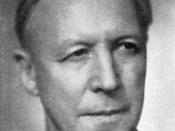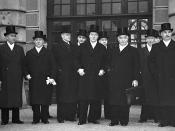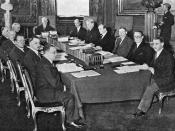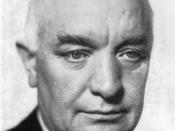The Midsummer crisis of 1941 remains one of the more important and over all controversial question of modern Swedish history. Sweden is known for being one of the more diplomatically neutral states, but was this really the case during WWII? --when Sweden gave into German demands. Was this a result of poor adaptation-politics? Or were they simply obligated to submit for the safety of the people?
After Denmark and Norway were invaded on April 9, 1940, Sweden and other neighboring countries became enclosed by Nazi and Russian troops. The combat in Norway resulted in Germany's demands for use of Sweden's transportation system to directly transport German troops through Sweden. At this time secret meetings of selected cabinet members took place to discuss the demands. This meeting resulted in the Riksdag giving in to the German demands, and allowing unarmed troops to travel via Swedish railroads, between Germany and Norway. The extent of these transports were kept secret from the public, but rumors soon got out, the current prime minister Per Albin Hansson was forced to officially and publicly confess to the German presence.
There are many sources stating different theories, in the following I shall analyze why and what King Gustav V and the Prime Minster Per Albin did according to five different sources. But it is hard to say just how much information the people in question had before they acted, and what actions were meant as they were interpreted, one can only begin to speculate.
According to Ek Boheman, had the king on 23/6, in a meeting at the Utrikesnamnden, stated that 'If they don't agree to your want, (permitting the German troops to enter) then I don't want to be a part of this longer. He did not at the moment literally mean this, according to the source (9), it was not meant as a threat, rather a 'guidance'. According to Boheman, Günther did not interpret this statement as a threat of abdication, rather it was more a statement of the king angst over the opposition, that the regering would not get their will through. The king believed that a rejection of the proposition would lead to a high risk of being dragged into the war. Per Albin had apparently, after the meeting said that he would use the king's statement in later meeting with his political party. According to Boheman, the king did not understand the severity of his statement until he had heard it being quoted by prime minister. When Per Albin had quoted the king at the meeting, had apparently the king been a bit shocked, he had liked the way it sounded as well as the roll he had played in the argument. It is hard to say whether or not the king and Per Albin had had further discussions that day, but Boheman does not think so, but it is had to say.
According to Ernst Wigforss, when the matter was first brought up (22/6), the social democrats aggressively voted down the proposal, -for allowing German troops to shortcut through Sweden. Per Albin, without making his personal opinion of the matter clear, he equally put forth the arguments both fore and against. Per Albin, according to Ernst Wigforss, did not want to stand for a rejection of the German proposal. Previous to this meeting, had the king stated that he 'would rather abdicate than take responsibility for a no,' Per Albin announced this at the meeting. A week later when he turned in his motivation in at the LO conference, he wrote that if the social democrats, whom were only 6 persons out of 15, would have had to leave the Riksdag if they had voted against, also instead of abdicating the king, along with support, would have over turned the social democrats. Ernst Wigforss writes that the discussion after Per Albins introduction showed that the majority wanted to give consent for the German troops to be transported through Sweden. The fear of dragging Sweden into the war if Sweden did not approve was enough as an argument.
In a telegram from the German ambassador Wied to Berlin, (Wiedrapporten,) it says that on the 25 of June, the king had called on Wied, to give him the message that the Riksdags group had accepted the proposal. According to the source (5) had the king acted in an enthusiastic manner, after being so active in the issue, the king was relieved to have gotten his will through. The king had also allegedly, asked that after this, Germany should not ask Sweden of anymore favors.
Amelia Posse, in her book - Atskilligt Kan Nu Sagas (1949), writes about how Prince Eugene invited his nephew Wilhelm and one other person, to a intimate dinner, where no others where present. At this dinner, Prince Eugene tells the two guests about the king's previous comment about abdicating. According to the source, the king had decided and informed him about his decision. When the king had first said that he would abdicate if the proposal was turned town, he had apparently not meant it at a threat; according to the source, he had no idea that his word would be taken that seriously. The king did not want to take the responsibility of turning the German proposal down; he was not ready to take on the consequences, which of one might have been --dragging Sweden into the war. One can speculate just how much of background information Prince Eugene had, and just how much the king had told him.
In a telegram that was sent on June 24at 0:30, to Berlin; Christian Günther (utrikesminister) had stated that there was no need to worry; the proposal would go through without any bigger problems. Günther stated of how he was hoping to give a definite decision by the very next day. It was already clear at this point, that the proposal would go through without any problems. It is hard to say if Günther had all the information on the meetings, but from what I believe I think so.
It is hard to say, even when looking at the sources, if the king's statement of abdication was meant as a threat, or if he was just outing his angst of the situation. It is also hard to say what Per Albins personal opinion of the proposal was, since he motivated his argument in the LO conference by saying that the social democrats would get kicked out of the Riksdag if they voted for a rejection, but at the same time at a previous meeting it had seemed like he was on the kings side, since he quotes the kings statement about abdication. Something else that is unclear is just how much information did German Ambassador Wieg have when he sent the telegram to Berlin.
My personal opinion on the matter is that the king did not think before he spoke, I do not think that the king meant what he said, and therefore when Per Albin later quoted him he was shocked that Albin had taken the comment seriously. But the king was not displeased at the bold statement; I think he liked the roll that he had played, especially afterwards when he was able to inform Germany of the Riksdags decision. Per Albin, I believe, did not go along with what the other social democrats felt, I believe that he and the king had the same opinion of the matter, but I believe, that he felt that he could not abandon his political party, and therefore motivated his decision with that they were forced to vote fore, other wise that they would be kicked out of the Riksdags group. I believe that, that's why he chose to quote the king, so that other political parties would feel the press of the kings want, which in turn might have minimized the chance for a rejection -and to preserve peace for Sweden.
Sources:
Amelia Posse: Atskilligt Kan Nu Sagas (1949) (Source 3)
Ernst Wigforss: Minnen III (1954) (Source 4)
Wiedrapporten (telegram sent from the German Ambassador Wied to Berlin) from the Historisk Tidskrift (1960) (Source 5)
Schnurres Rapport till Berlin den 24 Juli 194. From the Historisk Tidskrift (1960) (Source 8)
Ek Boheman: Pa vakt. Kabinettssekreterare under andra varldkriget (1964) (Source 9)





